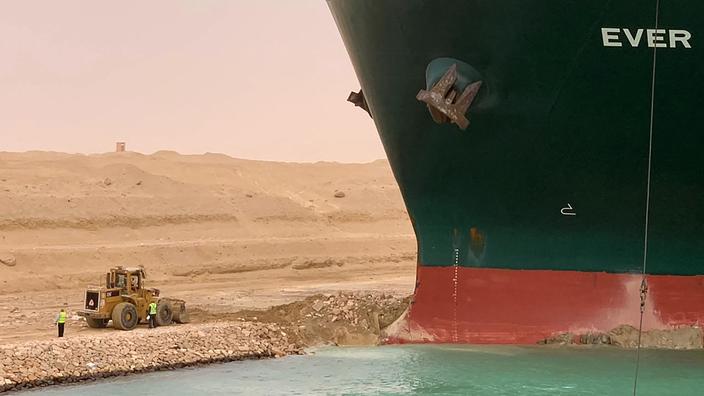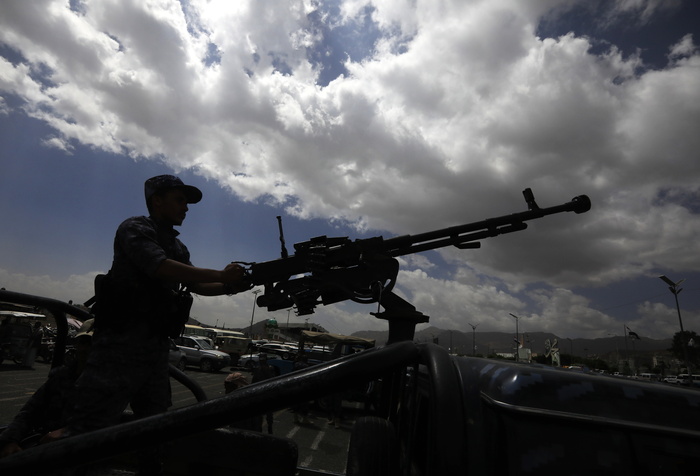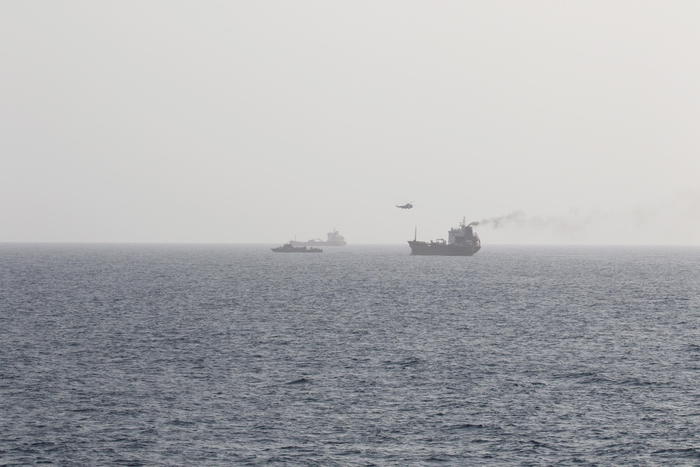The images have been circulating for 24 hours around the world: small backhoe loaders are trying, ants at the foot of a giant, to unlock the gigantic container ship Ever-Given, stranded since Wednesday through the Suez Canal, in Egypt.
By blocking the strategic passage between Asia and Europe, the sea juggernaut flying the Panamanian flag is jeopardizing all world trade, once again reminding us how much we depend on maritime flows.
Decryption with Christian Buchet, member of the Académie de Marine, director of the Sea Studies Center at the Catholic University of Paris and author of
La Grande Histoire vue de la mer
(Éditions du Recherches midi), 2018.
Read also: Suez Canal: clearing the stranded ship could take weeks
LE FIGARO - Why is this shipwreck so unusual?
Christian BUCHET -
Accidents sometimes happen, so do maritime traffic jams.
But imagine what a ship like the Ever-Given represents.
Some 400 meters long and 60 meters high, it's like knocking over a fifteen-story building in a canal that is between 280 and 345 meters wide depending on the location.
This story says something about the gigantism at work in global sea freight.
The ships are not only more numerous, but they are especially bigger and bigger.
The tonnage of goods has increased from 800 million in 2016 to nearly one billion today.
We need such massive buildings, necessary for the global economy.
But would we be able today to tow such mastodons if damage were to occur in the open sea?
Today, ships have taken on such dimensions that we cannot afford this gigantism.
And we end up with about fifty ships blocked by another in the Suez Canal.
What consequences for our daily life?
Many talk about the jump in the price of oil, but that is not what will have the most significant impact.
The Suez Canal is 50 ships passing through per day.
In these ships, there is 92% of world trade: raw materials, furniture, clothing, toys… The resulting traffic jam risks disrupting the entire logistics chain of world trade, with cascading consequences.
In the ports, everything is organized in a very precise way: a cargo ship arrives at a scheduled time to unload its goods in trucks ready to leave, before giving way.
An imbalance of even two days risks creating a lasting delay in all supply circuits.
The different sectors will fight for priority, which will translate into tensions with delays in production, deliveries, and rising costs.
What is Suez's strategic role in global shipping routes?
If they cannot pass through the Suez Canal, the ships must take the Cape of Good Hope and bypass Africa, i.e. a detour of 9,000 kilometers, 10 more days of transport and a 30% increase in emissions additional carbons.
During the Six Day War, between 1967 and 1975, the Suez Canal was closed.
It was then that we switched to the gigantism of ships, from tankers to super tankers in order to maximize these long routes.
When it reopened, flows in Suez exploded: thanks to this channel, products take less time to circulate, we consume as much and our purchasing power has exploded.
Today, the Suez Canal is Egypt's third largest source of income.
They hope by 2023 to pass 100 boats a day and dig a second canal to reduce waiting times from 11 to 3 hours.
The Suez Canal is in a way the umbilical cord of our trade with Asia.
Our dependence on this passage is our practical dependence on Asia.
That is to say ?
One of the first things that will be impacted by the sinking of Ever-Given is the supply of semiconductors, which come almost exclusively from China.
We are just in time for this material needed for the production of computer devices, the automotive industry and medical equipment.
However, they are made of rare earths exported 82% to Asia.
With the traffic jams in Suez, the production sectors in the health, automotive and IT sectors risk being disrupted.
What does this incident tell us about global maritime integration?
It reminds us, once again, how interdependent we are with maritime commerce. Maritime flows are to the economy what blood circulation is to the human body: this large vessel acts like a blood clot in an artery. Hence the need to integrate France as much as possible into these exchanges. Today, the main French ports are Hamburg, Antwerp and Rotterdam. That is to say that half of the containers that arrive in the PACA region come from these cities, because the port of Marseille, poorly connected inland. Conversely, China has just forged partnerships with Italy to integrate Trieste and Genoa into the maritime silk routes and develop their road and rail integration. What is happening in Suez should remind France that we cannot neglect international maritime trade.





/cloudfront-eu-central-1.images.arcpublishing.com/prisa/RD5GPAQKA5BG6GYHF6SJDTLLHU.jpg)



